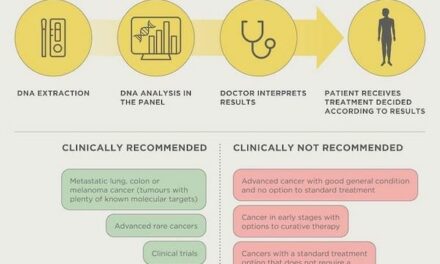Insight Genetics Inc, Nashville, Tenn, has launched the Insight RET screen, which detects oncogenic rearranged-during-transfection (RET) expression in non-small cell lung cancer (NSCLC) patients. Available through Insight Molecular Labs, the quantitative polymerase chain reaction assay detects RET expression driven by chromosomal fusions regardless of the fusion partner. The assay is validated in accordance with the terms of the Clinical Laboratory Improvement Amendments of 1988.
The current standard in diagnostic assay-drug development partnerships has been to use RET fluorescence in situ hybridization (FISH) to identify patients for clinical trial enrollment. Insight Genetics’ system provides results within 48 hours or less and with minimal tissue requirement. In a head-to-head comparison to a RET FISH assay, the Insight RET screen identified 67% more patients who were RET fusion-positive. The Insight RET screen complements the portfolio of assays currently offered by Insight Molecular Labs that detect targetable mutations, including ALK, BRAF, EGFR, KRAS, and ROS1.
“A number of targeted RET inhibitors are already in development or approved for patients with thyroid cancer and are currently under investigation in non-small cell lung cancer,” says Stephan Morris, scientific founder and chief scientific officer of Insight Genetics. “The Insight RET screen offers a diagnostic solution to help inform physician decisions for NSCLC, especially for patients who are negative for molecular drivers such as ALK, EGFR, and KRAS. We are excited to launch our Insight RET screen to help identify patients who will benefit from these targeted therapies, both through physician-ordered testing and in clinical trials.”
Chromosomal fusions involving the RET tyrosine kinase gene are driver mutations in papillary thyroid cancer and in approximately 2% of lung cancers. In NSCLC, the most frequently observed fusion partner with the RET kinase domain is the KIF5B gene (62%), with smaller fractions fused with either the CCDC6 (16%) or NCOA4 genes (8%). The kinase activity of RET is directed toward signaling substrates that regulate genes associated with increased cell survival and proliferation. A number of tyrosine kinase inhibitors have shown promise against RET-driven cancers.
The Insight RET screen was developed with support from Phase I and Phase II National Cancer Institute Small Business Innovation Research contracts. For further information, visit Insight Genetics.




